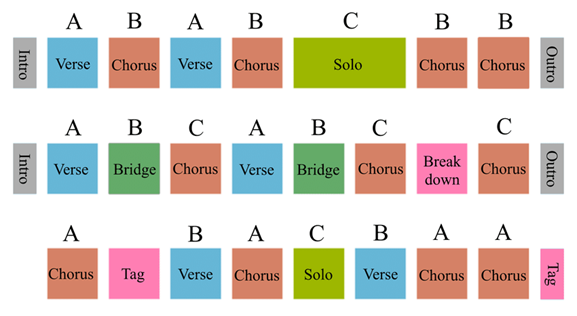Memorizing music is an important skill for musicians, whether you’re a beginner learning to play an instrument or a seasoned performer preparing for a performance. Having pieces memorized enhances your performance freedom and expressiveness. Here are some proven tips and tricks to help you memorize music more effectively:

1. Understand the Structure:
Analyze the Form: Break down the piece into sections. Understanding the form, such as A-B-A, sonata, or rondo, helps organize the music logically in your mind.
Identify Patterns: Look for repeating motifs, sequences, and chord progressions. Recognizing these patterns significantly simplifies memorization.
This is an example of my own memorization method. I will often break down the song in a visual format, allowing me to group the song into much more digestible pieces. Memorizing 30 seconds of music and then understanding where it repeats in the song is much simpler than memorizing even a short 2-minute piece.
2. Use Visualization Techniques
Mental Practice: Visualize yourself playing the music. Imagine the finger movements, the sound of the notes, and even the page layout. This mental practice reinforces physical practice.
Sight-Reading without the Instrument: Try reading and understanding the music without your instrument. This helps internalize the music without relying solely on muscle memory. You may feel funny miming the hand/finger motions of a song without an instrument in front of you - but trust me, that feeling will be gone when you get the gig and crush it on stage!
3. Break Down the Music:
Little Steps:
Segment Practice: Focus on small sections of the music at a time. Memorize each segment very well before moving to the next one. To gain a better understanding of the piece, you can analyze it from a music theory lens. I find it helpful to understand why certain chords were used instead of other ones (that pertain to the same key). This can also be helpful when memorizing longer pieces as music “moves” in the same way. If you can understand and recognize the patterns, memorization can become simple!

Linking Sections: Once you feel comfortable with individual sections, start linking them together. This helps understand transitions and flow. This is very important! Always work on transitions between A or B/Verse and Chorus. A B section or Chorus can be preceded by several chords moving in quick succession. The transitions are where most people will “blank out”, forcing them to stop during a performance or rehearsal.
4. Repetition and Consistency:
Daily Practice: Consistent practice over time is key. Frequent repetition helps solidify the music in your memory.
Vary Start and Stop Points: A lot of musicians, when beginning their musical journey, will practice a piece/song from the beginning of the song every time. This seems to make the most sense as that is how someone would read a book or start a movie. When memorizing a piece, it’s actually better to start and stop from random points in the song. Begin at the second chorus and play to the end, or stop at random in a specific bar, then count out four bars and try to play the rest of the piece from that point. If you prepare for the worst case scenario you’ll have the ability to remain calm and jump back into a piece even if you stop playing at a certain point, rather than having to begin again from the start.
5. Utilize Multiple Senses and Tools
Listen to Recordings: Familiarizing yourself with recordings of the piece can aid in internalizing the music and understanding its nuances.
6. Test Your Memory
Play from Memory: Regularly test yourself by playing sections without looking at the sheet music. This reinforces your memory under pressure.
Record Yourself: Listening to recordings of your playing can help you identify areas where your memorization may not be as strong, pointing out where you may want to focus more of your attention when practicing.
7. Stay Patient and Positive
Avoid Frustration: Memorization takes time and patience. If you come across areas of difficulty, take breaks and return with a fresh mind.
Maintain a Positive Attitude: Believe in your ability to memorize music. Confidence really enhances your performance. If you don’t have the confidence yet, we always say fake it ‘till you make it! No musician is 100% confident in their ability all the time. Every player will have critiques about the performance when they leave the stage, everyone gets the sweaty hands, the shakes, the butterflies from time to time. Just try to stay calm and have fun!
By incorporating these techniques into your practice routine, you can improve your ability to memorize music, making performances more fluid and expressive. Remember, effective memorization is not just about repetition - it is about understanding and engaging with the music deeply. Happy practicing!

